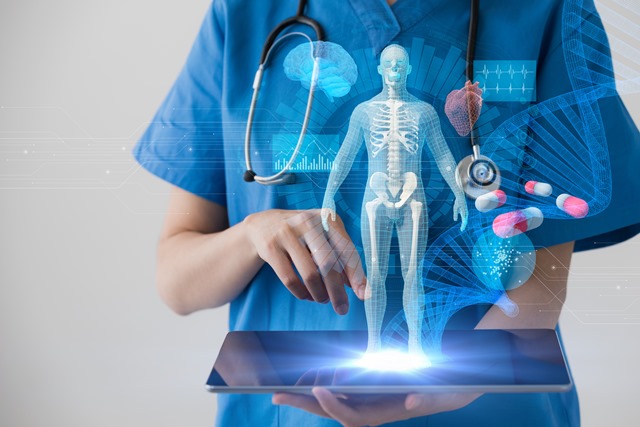
When Elon Musk declared that Artificial Intelligence (AI) represents the “biggest risk that we face as a civilization,” Mark Zuckerberg dismissed him as an irresponsible naysayer, declaring that he is excited and optimistic about AI. Progress in AI, said Zuckerberg, leads to improvements in many fields. At the top of his list of AI beneficiaries, Zuckerberg put “diagnosing diseases to keep us healthy.”
In addition to better diagnosis, AI promises to assist in finding new treatments and drugs, monitor, support and interact with patients and the elderly, and radically change how physicians, hospitals, and insurance companies operate. Healthcare has undergone a transformation over the past several years, shifting from paper-based records to electronic records, and rapidly adopting new online platforms and digital systems. These advances have led to an explosion of data, which artificial intelligence can use as the foundation for learning, predicting, and providing recommendations.
Based on data from billions of healthcare records, artificial intelligence has the potential to deliver a much-improved healthcare system, including rapid drug discovery and development; reducing medical errors; providing personalized, proactive, and predictive medicine; helping address the shortage of healthcare workers; and improving response to epidemics and population health management.
Here are a few examples of what AI can do in healthcare:
- Jvion analyzes more than a quadrillion clinical and non-clinical considerations and thousands of data elements as the foundation for its artificial intelligence that delivers recommendations that reduce the likelihood of an adverse event for specific patients.
- Atomwise uses artificial intelligence to help discover new medicines, using deep learning algorithms and supercomputers to analyze millions of molecules each day. For example, it found two drugs which may significantly reduce Ebola infectivity in an analysis that was completed in less than one day which typically would have taken months or years.
- In a recent study, an artificial intelligence system proved to be more accurate than human radiologists in diagnosing the presence or absence of tuberculosis in chest x-ray images.
- Ada Health has developed a smartphone app based on artificial intelligence that helps with the identification and diagnosis of specific health conditions via a chatbot interface, as well as other telemedicine functions.
- Turbine.ai designs personalized treatments for any cancer type or patient faster than any traditional healthcare methods by running millions of simulated experiments each day. It pinpoints the best drug to treat a specific tumor, using artificial intelligence to identify the biomarkers that signal sensitivity to treatment.
- Researchers recently developed artificial intelligence that can spot tiny structural changes in the brain caused by Alzheimer’s a decade before symptoms even appear. Early detection allows patients to seek treatment that can slow down the condition’s effects.
- CareSkore provides personalized healthcare management, leveraging AI to generate real-time predictive and prescriptive analytics to reduce hospital readmissions.
- Mendal.ai scans thousands of scientific papers, using artificial intelligence to match the latest medical advice with patient records, assessing the patient’s eligibility for each suggested treatment.
These examples show that artificial intelligence has started to make an impact on healthcare delivery and practice, but many obstacles stand in the way of realizing its potential. These include the paucity of high-quality data, lack of cooperation among healthcare providers, AI skills shortage, data security, and questions about the veracity of algorithms.
- Data quality: Healthcare data is largely unstructured data that is produced in a variety of formats using incompatible codes descriptions. The lack of interoperability and data-entry standards has led to data that is inaccurate, missing significant information, and is difficult to integrate across healthcare systems.
- Lack of cooperation: There are many instances of the sharing of data, models, and methods among healthcare providers and with the public (e.g., the Living Heart Project). But healthcare providers often compete for patients, research grants, and prestige. As a result, they sometime keep their data and their AI-related efforts to themselves.
- AI skills shortage: As with any other emerging technology field, it is difficult to find people with the right expertise and experience to do AI-related work. The new approaches to AI, especially deep learning, have started to prove their potential only five years ago. Compounding this recency problem is the need to have people with both experience with these new approaches and knowledge of the healthcare field.
- Data security: Hospitals and other healthcare organizations have increasingly become targets for ransomware attacks and have suffered data breaches. This has led to a general perception of poor data security and cybersecurity practices in the healthcare industry.
- Trust: The new approaches to artificial intelligence, while remarkably successful in domains that are very important to healthcare systems such as natural language understanding and image recognition, are notorious for being “black boxes.” More often than not, it is difficult to understand how the AI system has reached its conclusions. While this may not make much of a difference when the objective is to identify a cat in a photo, it is very important when a medical diagnosis or an insurance rate are at stake.
No doubt these obstacles will slow down the progress of AI in healthcare. Still, a recent survey by Healthcare IT News and HIMSS Analytics found that 35% of healthcare organizations said that they will leverage AI within two years. Accenture estimates that key clinical health AI applications can potentially create $150 billion in annual savings for the US healthcare economy by 2026. And the McKinsey Global Institute (MGI) estimates that personalized medicine may reduce health expenditures by 5% to 9%, add 0.2 to 1.3 years to average life expectancy, and increase productivity by $200 per person annually.
Globally, says MGI, the economic impact of AI—just from personalized medicine—could range from $2 trillion to $10 trillion by 2025. That’s quite an impact.
